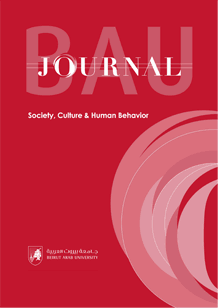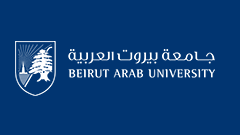Volume 4, Issue 2 (2023)
Dr. Jo Peat - Head of Educational Development University of Roehampton London, UK
The breadth of educational research across Society, Culture and Human Behaviour at BAU is clearly illustrated in this issue, which ranges between links with the human condition, humans as social actors and human rights and wellbeing. The authors explore different dimensions of life through a range of research hypotheses and methodologies.
Educational research is at the heart of our educational practices and vital to the growth of knowledge and understanding in all areas of human endeavour. A recent and very welcome trend in educational research has been the expansion of research communities in universities to include students at all levels of study, recognising the value that student-academic partnerships bring. This sharing of scholarly practice between experienced and apprentice researchers gives rise to a real richness in our practice and is of benefit to all.
Society, Culture and Human Behaviour demonstrates the opportunities such partnerships afford with its inclusion of papers from doctoral students and professors at BAU. Contributions focus on areas including Human Resources Management, e-Commerce, Human Rights and Wellbeing, all linked by the focus of the journal: to highlight the interrelationship between general society, its inherent culture and the direct effect on human behaviour. Perhaps more importantly it illustrates the importance of educational research to society in general, putting the spotlight on culture, society and behaviour through a range of disciplinary lenses.
Research, taken to include scientific research, creative endeavour and scholarship leads to the advancement of knowledge, essential to human flourishing. Research is a core part of the mission of universities, and universities are where students come to develop their knowledge and understanding of different fields of activity, where they learn to develop skills, values and attributes needed for successful careers and, more importantly, to become good and worthwhile citizens. Part of this comes from exposure to academics at the cutting-edge of their fields who interweave their research with their teaching to enthuse and inspire their students, the next generation of researchers, scholars and thinkers. The virtuous cycle is thus perpetuated.
Through different disciplinary lenses, the papers in this issue reflect aspects of human life, society and culture and it is this transdisciplinarity which is particularly striking, demonstrating the interrelatedness of academic study. Abdel-Khaled, Bakhiet & Osman explore the associations between personality and obsession-compulsion through a survey of students in Khartoum university, while El Nayal & Sayegh examine the intersection between human rights and wellbeing, focusing on how abuse in all forms is a major culprit in the emergence of mental disorders and maladjustment in society. Vernal reports on disability rights in India and the gap between what could have been achieved and actual achievements, the lacuna between rhetoric and reality. Factors affecting political participation in Lebanon are the subject of Homssi, Ali and Kurdi’s paper. Mazloum looks at self-identity and self-status of millennials thought the lens of luxury brands using a conceptual framework model and the impact of the Covid-19 pandemic on consumer purchasing is explored by Kaabour. Several papers focus on the world of business, including Baydoun and Paul’s consideration of the impact of socio-demographical and psychological factors on investor intentions. Training and development in work settings are explored by Baydoun and Salem and audit practices by Kibrit, Moueddeen and Hegazy. Kadi, Baydoun and Ali consider the emotions intelligence of nurses and job stress, whilst Habli looks into temporal mutilation in Beloved.
This is a rich and eclectic compilation of papers, which serves to illustrate the scope of Society, Culture and Human Behaviour and the richnesses afforded by interdisciplinary and intergenerational cooperation and partnerships in the academic endeavour.
Articles
THE BIG-FIVE PERSONALITY FACTORS AS PREDICTORS OF OBSESSION-COMPULSION AMONG A SAMPLE OF UNIVERSITY STUDENTS FROM SUDAN
Ahmed M. Abdel-Khalek, Salaheldin Farah Bakhiet, and Habab Abdalhiy Osman
العوامل الخمسة الكبرى للشخصية المنبئة بالوسواس القهري لدى عينة من طلاب جامعة الخرطوم بالسودان
Article Language: Arabic
A TWO-WAY TRAFFIC BETWEEN PSYCHOLOGY AND HUMAN RIGHTS
Mayssah El Nayal and Mona G. Sayegh
Article Language: English
RIGHTS OF PERSONS WITH DISABILITIES IN INDIA: PROVISIONS, PROMISES AND REALITY
Triveni Goswami Vernal
Article Language: English
SHAPING MILLENNIALS’ ATTITUDES TOWARDS LUXURY BRANDS IN INTERNATIONAL CITIES: THE CASE OF ABU DHABI
Zeina Mazloum
Article Language: English
ONLINE CONSUMER PURCHASING DURING THE PANDEMIC OF COVID-19: AN APPLIED STUDY IN LEBANON
Soumaya M. Kaakour
Article Language: English
FACTORS INFLUENCING POLITICAL PARTICIPATION IN LEBANON: THE MEDIATING ROLE OF PERCEIVED CONGRUENCE
Mahmoud A. El Homssi, Alaaeldin A. Ali, and Amal Kurdi
Article Language: English
OFFSHORE COMPANIES AUDIT PROCESS EFFECTIVENESS: EVIDENCE FROM LEBANESE AUDITING PROFESSION
Jalal Kibrit, Rasha Nouraldeen Assistant Prof., and Wagdi Hegazy Prof.
Article Language: English
NURSES’ EMOTIONAL INTELLIGENCE, BEHAVIOR AND THE MEDIATING ROLE OF JOB STRESS IN LEBANON
Suzan S. Al Kadi, Abdul Rahman Beydoun, and AlaaEldine A. Ali
Article Language: English
THE DETERMINANTS OF E-COMMERCE AUDIT PROCESS EFFECTIVENESS: DOES AUDIT TECHNOLOGY MATTER?
Jalal M. Kibrit, Rasha M. Nouraldeen Assistant Prof., and Wagdi Hegazy Prof.
Article Language: English
RISK TOLERANCE, TIME HORIZON, AND ESTATE INTENTIONS: JUST HOW IMPORTANT ARE “CIRCUMSTANCES AND ASSOCIATED EMOTIONS”?
Abdul Rahman Beydoun and Karen Paul
Article Language: English
LITERATURE REVIEW ON TRAINING AND DEVELOPMENT IN WORK SETTING
Abdul Rahman Beydoun and Rima F. Saleh
Article Language: English
Book Review


